バングラデシュでの栄養バランスの偏りや運動不足に起因する肥満予防のための取り組み
【2019年11月の活動報告】
今期(2019年10月~2020年9月)のユーグレナクッキー配布目標210万食に対し、11月までに約44万食(進捗率:21%)を配布しました。
1.栄養バランスの偏りや運動不足に起因する肥満予防のための取り組み
アジア最貧国と呼ばれているバングラデシュですが、驚くべきことに肥満率が上昇しています。バングラデシュの体重超過または肥満の割合は、1980年で成人の7%、子どもの3%でしたが、2013年には、成人の17%、子どもの4.5%に上昇しています。また、2018年にダッカの医科大学がスラム街の子どもたちを対象に調査したところ、約8人に1人が太り気味または小児肥満でした。日本の肥満率は、20歳以上の男性が約31%、女性が約22%のため、依然としてバングラデシュの肥満率は日本と比べ低い状況です。しかしバングラデシュは栄養失調と肥満という「二重の負担」に直面しており、政府は対策が必要であると考えています。主な肥満の理由は、富裕層では、食の欧米化に伴うジャンクフードの摂取増加や運動不足が挙げられます。一方、スラム街に住む層では、炭水化物中心の栄養バランスの偏った食生活や運動不足が挙げられます。実は、バングラデシュは、世界で1番米の消費量が多く、1人あたりの1日の米の消費量は日本ではおにぎり約2個半分なのに対し、バングラデシュではおにぎり約10個半分にものぼります。しかし、おかずはジャガイモのカレーとゆで卵だけの場合もあり、バランスのとれた食生活をおくれていません。炭水化物摂取過多のため、糖尿病を患っている成人患者数も少なくありません。
子どもたちの運動不足に関しては、以前ご紹介しましたが、ダッカでは建物が密接しており、ほとんどの学校に運動場がなく遊べる場所もないため、運動する習慣もありません。また、登下校の習慣も大きく影響しています。ダッカでは「スクール・バン」と呼ばれる荷台の付いた自転車やリキシャ(日本の人力車のような乗り物)で通学する子どもたちが多く、歩いて登下校する習慣が根付いていません。このような背景の中、GENKIプログラム対象校のある小学校では、日本でいう集団登下校のようなものを2012年から実施しています。これにより、子どもたちは毎日歩く習慣が身に付きました。一般的に栄養不足に悩んでいる子どもたちですが、子どもの頃の食生活や運動習慣が、成人してからの健康状態に大きく影響するため、バランスのよい食生活や運動習慣を身に付けることも重要です。
ユーグレナクッキーで肥満を解消することはできませんが、栄養バランスの偏りを軽減することで、肥満からくる心臓血管疾患、糖尿病などを予防することが期待されます。
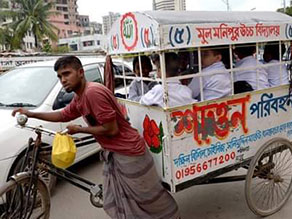
写真-1:ダッカで一般的な通学手段のスクール・バン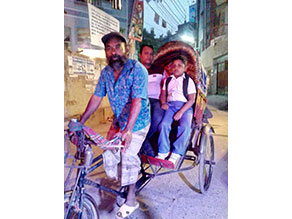
写真-2:子どもの安全のためにリキシャで送迎する親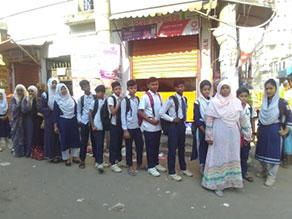
写真-3:集団下校する子どもたち
2.両親の職業紹介
皆さんは、子どもの頃に両親の職業について調べたり、働いている様子を絵に描いたりした経験はありますか?今月は首都ダッカにあるGENKIプログラム対象校のオポロジョ・モハマドプール小学校に通う、小学5年生(13歳)のリヤちゃんが描いた「私たちの両親の職業」について紹介します。リヤちゃんが通うスラム街にある小学校は290人の子どもたちが通っていますが、その子どもたちの家庭のほとんどが低所得者と言われる給与水準で生活しています。
リヤちゃんは授業の中で、友達と一緒に自分たちの両親の6つの代表的な職業について話し合い、クラスの中でも特に絵が上手なリヤちゃんが代表して1つの絵にまとめました。そこに描かれた職業は、① 縫製工場の作業員、② 衣服の仕立屋、③リキシャの運転手、④ 車の運転手、⑤ 家事手伝い(家政婦/夫)、⑥ 小売店の販売員です。日本で最も多く挙がりそうな職業である「会社員」は、バングラデシュでは高学歴者の職業であるため、この絵には描かれていませんでした。6つの職業は、いずれも12,000~18,000円という月収の職業です。ダッカでは4年制大学を卒業した新卒者の初任給が18,000~24,000円と言われているため、スラム街の月収は新卒者の初任給と比べて約30~50%も低い水準です。
バングラデシュは、世界でも有数の衣料品輸出国であり、国の輸出全体の80%以上を衣料品が占め、何百万人という作業員が衣料品関連の仕事に従事しています。ダッカ市内にも多くの縫製工場が点在しており、出勤時間帯には工場に向かう多くの作業員が周辺道路を埋めるように歩いています。リヤちゃんはお父さんとお母さんとの3人家族で、両親は縫製工場で働いています。勤務時間は日本と同じように、8時に出勤し18時まで勤務します。リヤちゃんは、放課後近所の知り合いの家で、宿題や大好きな絵を描きながらお母さんの帰りを待って過ごします。スラム街では共働き夫婦が多いため、知り合いの家で過ごしたり、料理、掃除、洗濯などの家事をしたり、弟や妹の世話をしたりするのが一般的です。
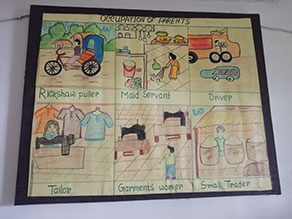
写真-4:リヤちゃんが描いた6つの代表的な両親の職業の絵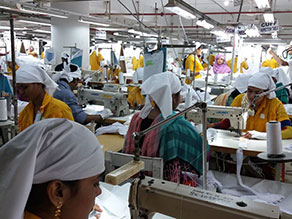
写真-5:縫製工場での作業の様子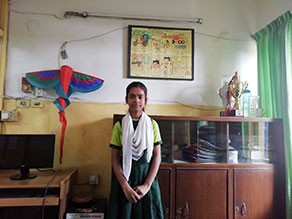
写真-6:教室に貼られているリヤちゃんの絵とリヤちゃん
3.Japan Action Tank Forum 2019 開催
2019年11月24日に東京・丸の内にて、Japan Action Tank Forum 2019が開催されました。会場は満席となり、大盛況のうちに閉会しました。Japan Action Tankとは、グラミン銀行創設者であり、2006年ノーベル平和賞受賞者ムハマド・ユヌス博士が創出したソーシャルビジネスを日本の企業や団体とともに普及させ、実践していくことを目的に設立された一般社団法人です。ユヌス博士を会長に迎え、当社社長出雲が代表理事、同じく執行役員の佐竹が事務局長を務めています。ソーシャルビジネスを実践する企業・団体やこれから始めようとしている人々の情報交流の場でもある“Action Tank”のモデルは、既にフランス(France Action Tank)やインド(Indian Corporate Action Tank)で活動を開始しており、それに次ぐ形で日本でも始動しました。
Forumでは、ユヌス博士による基調講演を始め、ソーシャルビジネスを実践している企業・団体による事業の事例紹介、社会の多様化(ダイバーシティ)に向けて活動している方々によるパネルディスカッションを行いました。ユヌス博士による基調講演では「今日自らの意思でここに集まり、社会課題解決に向けたヒントを探しに来たあなた方こそが、リーダーとなるのです。今の時代に起きている課題に対してアクションを起こしていってください」と、会場に集まった方々に熱い思いを伝えてくださいました。また、事例紹介では、国内外の栄養や貧困問題、地球温暖化、教育問題といったさまざまな社会課題が紹介され、雇用を創出しながら持続可能なソーシャルビジネスを実践している人たちからの強いメッセージを共有することができました。
2015年に国連サミットで採択された国際目標である、17の持続可能な開発目標(SDGs)の達成に向けて、日本の企業・団体がソーシャルビジネスを通じた持続可能な世界を実現していくためにもJapan Action Tankが担うべき役割は重要だと感じています。今後も本レポートの中で、Japan Action Tankの活動をご紹介させていただきます。
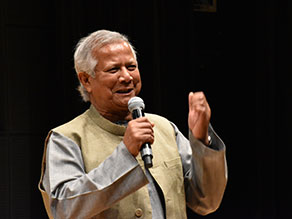
写真-7:基調講演を行うユヌス博士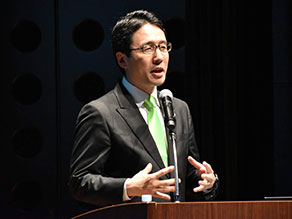
写真-8:Japan Action Tankについて説明する出雲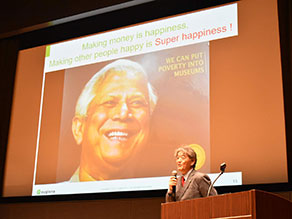
写真-9:バングラデシュでの事例紹介をする佐竹
引き続きご支援をよろしくお願いいたします。
株式会社ユーグレナ
海外事業開発部 / バングラデシュ事務所

